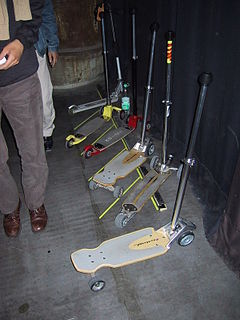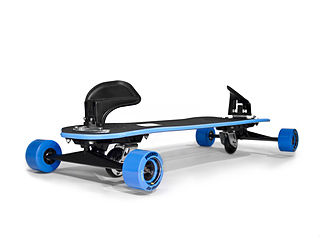History
Shortly after urethane wheels became available, Jim Rugroden, a student in Berkeley, California, designed and built the first MotoBoard in the garage of his brother's home in the South San Francisco Bay Area town of Campbell while on break from his physics studies in summer 1975. The MotoBoard evolved from a simple push start prototype, to a precision automatic shaft-driven sport vehicle.
During a photo shoot for Skateboarder Magazine in Carlsbad, California, near San Diego, Rugroden met Bill Posey, an onlooking entrepreneur, and they eventually teamed-up to form Quantimotion, Inc., DBA MotoBoard International.
Originally, MotoBoard Intl. operated from both a small northern California shop in Sunnyvale, where Rugroden manufactured the units, and Posey's established southern California office in Carlsbad, where much of the promotion and sales were generated. In 1979 the company was consolidated in a new, much larger facility in the newly established Foreign Trade Zone complex in San Jose, California

Skateboarding is an action sport which involves riding and performing tricks using a skateboard, as well as a recreational activity, an art form, an entertainment industry job, and a method of transportation. Skateboarding has been shaped and influenced by many skateboarders throughout the years. A 2009 report found that the skateboarding market is worth an estimated $4.8 billion in annual revenue with 11.08 million active skateboarders in the world. In 2016, it was announced that skateboarding will be represented at the 2020 Summer Olympics in Tokyo.
Boardsports are sports that are played with some sort of board as the primary equipment. These sports take place on a variety of terrain, from paved flat-ground and snow-covered hills to water and air. Most boardsports are considered action sports or extreme sports, and thus often appeal to youth. A large proportion of youth partaking in these sports, together with aesthetic damage to property from sports like skateboarding, has led to many board sports being marginalized by the greater world of sports in the past. However, many board sports are ever-more frequently gaining mainstream recognition, and with this recognition have enjoyed wider broadcast, sponsorship and inclusion in institutional sporting events, including the Olympic Games.

Steve Caballero is an American professional skateboarder and musician. Caballero is known for the difficult tricks and air variations he invented for vertical skating and for setting the long-standing record for the highest air achieved on a halfpipe. In 1999, Thrasher Magazine named Caballero the "Skater of the Century".

A longboard is a type of sports equipment similar to, but not the same as, a skateboard. It is often longer than a skateboard and has a wide variety of shapes. It tends to be faster because of wheel size, construction materials and more precise hardware. Longboards are commonly used for cruising, travelling and downhill racing, known as longboarding, rather than skateboarding. Longboard 'dancing' and 'freestyle' are also becoming more popular styles, in which the rider utilises skateboard-like motions and steps up and down the board, generally in a fluid manner.

Longboarding is riding on a longboard. Longboards vary in shape and size. Compared to skateboards, longboards are more stable, and have more traction and durability due to larger wheel size and lower wheel durometers. Many longboards use trucks (axles) that have different geometric parameters than skateboards. There are a variety of longboard disciplines, and types of longboards. Longboarding has competitive races down hill where riders can reach speeds exceeding 60 mph (97 km/h). The wider turning radius of longboards can turn, as well as their ability to coast long distances make them more suitable for cruising and commuting on streets than regular skateboards.

Street luge is an extreme gravity-powered activity that involves riding a skateboard in the supine position down a paved road or course. Street luge is a discipline of skateboarding and can be done on any skateboard, but specifically designed street luge skateboards are designed for stability and control at speeds up to 100 miles per hour. Like other disciplines of skateboarding, street luge is often done for sport and for recreation.

A flowboard is a variation on a skateboard, combining aspects of surfing, skating and snowboarding. There are three sizes made by the brand Flowboards: 32", for tricks and smaller riders; 36", the standard size; and 42", the large downhill bomber.

Thrasher is a skateboarding magazine founded in January 1981 by Eric Swenson, and Fausto Vitello, and published by High Speed Productions, Inc. of San Francisco, US. The publication consists primarily of skateboard and music-related articles, photography, interviews and skatepark reviews. The magazine also maintains a website, which includes segments with names such as "Firing Line" and "Hall of Meat", an online store, a video collection, a radio show, and a forum for registered users. The company also owns and operates the Double Rock indoor skateboarding facility.
Frank Nasworthy is notable in the history of skateboarding for introducing polyurethane wheel technology to the sport in the early 1970s.

A kick scooter is a human-powered street vehicle with a handlebar, deck, and wheels propelled by a rider pushing off the ground. Today, the most common scooters are made of aluminum, titanium, and steel. Some kick scooters made for younger children have 3 to 4 wheels and are made of plastic or don't fold. High-performance racing scooters made for adults resemble the old "penny-farthing".
Jamie Thomas is an American professional skateboarder and skateboard industry entrepreneur. Thomas is the owner and founder of Zero Skateboards and Fallen Footwear, until he announced its closure in January 2017. Thomas' nickname in the skateboard industry is The Chief.
Phil Esbenshade, also known as Phil E., was born in Philadelphia, Pennsylvania. He was a well known professional skateboarder in the second skateboard heyday of the late 1980s. Five pro model skateboard decks bearing his name and 'E' initial were made by Skull Skates. Also on the Skull Skates team at the time were Duane Peters, Josh Marlowe, and Steve Olson. He retired from the sport in the 1990s and later became a Prosecutor and College Professor in California's Central Valley.
Tum Yeto is a skateboard distribution company that operates out of San Diego, California, United States (U.S.).
Ty Scott Page was a professional skateboarder who was known as one of the most innovative skateboarders in the world. Ty Page was a leader in the skateboarding scene during "the golden era" of skateboarding in the early 1970s. He is best known for creating a freestyle trick called the Ty Hop, which nowadays is known as the "shove-it."

A skateboard is a type of sports equipment used for skateboarding. They are usually made of a specially designed 7-ply maple plywood deck with a polyurethane coating for smoothness and durability and wheels attached to the underside.

A skateboard style refers to the way a skateboarder prefers to ride a skateboard. Skateboard styles can be broadly divided into two different categories: skateboarding to perform tricks and skateboarding as a means of transportation. Styles of skateboarding have evolved over time and are influenced by a number of factors including sociocultural evolution, mass media, music, technology, corporate influence and individual skill level.

A freeboard is a specialist skateboard designed to closely simulate the behaviour of a snowboard. Freeboards were developed to allow snowboarders to transition to skateboarding without the need to adapt to a smaller deck and narrower wheel-base.

An electric skateboard is a personal transporter based on a skateboard. The speed is usually controlled by a wireless hand-held throttle remote or rider body weight-shifting between front of the board for forward motion and rear for braking. As for the direction of travel to the right or left, it is adjusted by tilting the board to one side or the other. Electric skateboard are not considered as vehicles and do not require registration or licensing.
A Penny board is a type of plastic skateboard, known within the industry as a short cruiser. The term "Penny" is synonymous with "Penny Skateboards", an Australian-based company founded in 2010 by Ben Mackay. Penny is a registered trademark for skateboards, but has been widely genericised to describe all small plastic skateboards due to the brand's popularity. Penny Skateboards pair a plastic deck with cruiser wheels and trucks. This combination now epitomises a "Penny board" in generic terms. Because they are made out of plastic, Penny boards have a lighter weight, but are also strong.

Boosted is an American manufacturer of electric skateboards and electric scooters based in Mountain View, California.












